Diary of Anais Nin, Volume 4 Read online
Page 2
Will it surprise you if I say the only writer I care to rival, or surpass if possible, is Rimbaud? I am working feverishly to wind up all my autobiographical work, so that I may embark on a totally new venture in writing. The water colors helped me a lot, gave me courage. It's a strange story, too long to relate here.
Oh, yes, I must tell you that there is a writer named Wallace Fowlie who would like to get in touch with you. He is a Catholic writer, a friend of Maritain and others like him. He is a Professor at Yale and writes equally well in French and English, appears in two languages. He admires your work very much.
Also I had a letter from Larry Durrell the other day, from Cairo (or Alexandria) saying that he and Nancy had parted and that she and the child were now in Jerusalem. He asked me to send you his love. He seemed depressed—mostly about the war I gather.
I wrote a prophetic piece which will appear in the new book, and which nobody likes, apparently—called "Of Art and the Future." I would like to know what you think of it, when you see it. It is not a very bright picture, I must say. People do seem to insist on making the future bright, and yet anyone with half an eye can see the makings of the future right now. They expect miracles, but refuse to recognize the real miracles which take place....
One last thing ... you have undoubtedly your warmest admirer—of person and writing—in Jean Varda. He talks about you incessantly. Seems to have divined your whole being....I do hope he will see you when he goes to New York this summer. I am sure you will like him. I know very well the collage he sent you, because I slept with that collage several weeks. It was I who inspired the transfer. Immediately I knew the title of it. I knew you must have it. It meant a great deal to me, this collage. Watch it in changing lights—specially very early morning light. Or with colored lights, if you use colored shades....
Anyway, he is one of your great allies, one you didn't know about till recently. And there must be many more. You should have faith always, and more patience. You have the faith that moves mountains, where others are concerned, and yet when it comes to yourself that little grain of doubt which was implanted in you can corrode everything—and always when things are in your grasp. This is the only curse that has been put upon you, and you must fight it alone, or it will destroy everything you labored so triumphantly to build up. Don't resent my saying this! I am not saying it from some high and mighty seat. I have been quite crushed, believe me. But I seem to weather all storms. And the more I reflect on it the more I believe it is because I have always a kernel of faith left, and nothing destroys it, nothing can. But it is a faith in the whole large process, not in any one person, thing or idea. And my faith in you is indestructible.
I found the letter Jean Varda had written when he sent me his collage:
I take the liberty to send you a collage with a vain title: "Women Reconstructing the World." And if you should enjoy it, I would feel less indebted and wildly proud to have returned a small part of the joy I have received from the rivers of delectations which flow from your pen.
The first time you appeared to me after the reading of Winter of Artifice, you said to me: "It is undeniable that the source of all our miseries comes from our obstinacy in maintaining that Paradise is a garden. The psychoanalysts have added to the confusion by interpreting the floating dreams as a flight into space. The mystic is the only one who knows that all states of ecstasy are a state of floating in an ambiance more heavy than air. I say, but do not repeat it to anyone who is not ripe enough to receive it, Paradise is at the bottom of the sea. And I can also prove to you that angels are ships. They have no wings but large sails which they unfold noiselessly at night to cross Eternity."
As before being a painter I was a boat builder, your words made a deep impression on me.
The second time you appeared to me, always rigorously veiled (by water, as I realized later) you showed me a naked foot of hallucinating beauty which made me realize instantly that you belonged to the great lineage of tragic women: Cassandra, Clytemnestra, and Iseult. And you said: "And all art which is after all but an overflow of Paradise's surplus tends to only one thing: to recreate water. Think of Nijinsky, who forgot himself in space, think of Shankar who struggles slowly amidst algae, and Isadora who evoked a giant medusa. Think of the ballet exercises. The hand reproduces resistance to water. And what is painting but absolute transparency? It is art which is ecstasy, which is Paradise, and water."
Then I began to suspect that Anai's Nin is a pseudonym and that in reality you are the great Amphitrite in person, and perhaps angry with me for revealing such a well hidden secret.
Olga only breaks down in my presence. Externally, she is a femme du monde, every hair in place, subdued, wearing tailored suits, her kimono a duplicate of her husband's, talking objectively about politics. But suddenly she calls me. She is in great pain from an ulcer. She is emotional, almost hysterical. When I arrive, she breaks into a wild confession. The stories in Under a Glass Bell renewed her contact with her young emotional self, the self who wrote poetry before she became involved in politics.
"It seemed more important to work in politics. To be of public service."
"But how can you determine what is of public service? You define it as adopting one political system rather than another, and converting everyone to it. But next month the system is proved corrupt, and disintegrates."
Olga felt she had deserted her poet self for a more altruistic occupation. Now her task was over. It was rendered futile by the turn of events. She is returning to an incomplete life, to an incomplete woman, to a half-created artist. This half-woman returns to haunt and harass her. Olga goes back to delve into waters too long stagnant while she served an impersonal cause. She had perceived the truth at the beginning, when she first read poetry to the workmen and inspired them. She exchanged this power for the clichés of political propaganda, mouthing others' words in the same mechanical way I mouthed the questions and answers of the catechism when I was a child:
"Who made the world?"
"God made the world."
Olga had given herself to a cause, a system: this system and cause had failed. While she gave herself, her own development on a deeper level was static.
When the system failed (historically), there was never a question that it may have failed because it was composed of incompleted human beings, human beings who had ceased to work on their individual development.
And it is this development which I believe will influence history from within, rather than systems. If enough individuals had worked at their own development, history would be formed as natural things are formed, organically, from the impulse of quality and maturity.
And now Olga was asking: "Where am I?"
Twenty years lost, from the time she first read her poems to the Russian workers, with her genuine flamboyant red hair and her husky voice, until now when she was aware of the collapse of the values she had served. She was back in time twenty years, back to the age of twenty-one. No longer the political journalist, no longer the woman of the world, but a woman in quest of her poetic self, trying to unlock the many doors she had closed upon this self. She had not only locked them, as she said, but she had lost the key.
I suggested the key lay in her ambivalence. She swings between attraction to my work and detraction of it. Spontaneous attraction ("The story of my soul is in your stories") and detraction—out of guilt, considering what I do contrary to the serving of a political cause.
"But poetry is a cause, too. It gives us strength and faith to go to battle, to endure. Don't you think your poems gave the workmen as much will to live as political slogans did?"
"Someone," I added, "has to supply the oxygen, to balance the horrors created, invented by politicians for their own glorification. You don't think men in politics are in it for the sake of humanity, do you?"
During the night, she dreamed Djuna Barnes and Anaïs Nin She was seeking the lost poet, Olga. So it was me, now, who was serving a human being. While she served the revolut
ion which had been her dream and her drama, I was preparing a world which would restore her, a vital world which does not crumble under systems, dictators, or power struggles.
"Every time our hope for a better world is based on a system, this system collapses, due to the corruptibility and imperfection of human beings. I believe we have to go back and work at the growth of human beings, so they will not need systems, but will know how to rule themselves. Now you have suffered the shock of disillusion in an ideology which has betrayed its ideals. It is a good time to return to the creation of yourself, not as a blind number in a group, but as an individual. Poetry is merely the language of our night-self, in which are imbedded the seeds of all we do and are in the day. We can only control it by knowing it. Better to make this journey back to what you had first intended, rather than to die of disillusion."
I gave her a copy of Nightwood. I gave her Jean Giraudoux' Choix des Élues, to help her re-enter the world of myth which alone makes the monstrosities of history bearable.
She had to return to an incomplete woman because the task she had undertaken had not matured her. When we blindly adopt a religion, a political system, a literary dogma, we become automatons. We cease to grow. When I first met Olga, she was writing a book about the first female captain of the Soviet merchant navy, Valentina Orlikova. A photograph of her had appeared, which all of us fell in love with. Short dark hair, regular features but fleshy and sensuous, beautiful dark eyes, clear-cut and stylized in her captain's uniform. She conveyed firmness and capability, without hardness or coldness. She became a symbol of woman's most secret wishes: to be able to be free and in command of her own destiny, responsible without loss of her womanliness.
We wanted to imitate Valentina Orlikova. We saw ourselves trim, efficient, capable captains of our ship and our own lives. It was not a desire to be a man, but to be free and capable of self-direction and professional growth. I cut my hair short. This admiration for Valentina led to great misunderstandings. Gonzalo thought it was a revolution, and asserted he could never make love to a captain of a ship, a sniper, a lieutenant commander, no matter how beautiful she was.
Letter from Henry:
The patron came through. I am to get two hundred dollars a month for a year, unless in the meantime someone else steps in and wishes to aid me. Pay back when and how or if I like. So here is a hundred, and if nothing goes amiss you will get a hundred each month. This hundred, which was in addition to the two hundred, was to have gone for travelling expenses—to Mexico. But I am not going. I have the house (ten dollars a month, or free if I choose) and it suits me to the ground. I am alone and I am working. So I won't budge until I finish one book at least. Then I may think of Guatemala, where I am told the exchange is fifteen to one in our favor. In that way I can do more for all concerned with what comes to me. I don't count on good fortune (material fortune) to last very long—it's not in my destiny, I feel.
[Bern] Porter writes me that you have abandoned all thought of bringing out the diary here in America....
Why don't you begin and trust in providence that money will be forthcoming to publish further editions? By the time you are ready to leave America you may have everything published but the difficult parts, which you can then complete in Europe. I am certain you will receive help.
I am living on the same scale as always. I have no big needs. But I am called on to help frequently now—and I do all I can. So, the more I get the more I will shell out. I am just a distributor.
I understand you are now writing a Proustian novel, so Porter says. Your two books from your own press are causing a stir everywhere. You should never have to hand-set type again. People should come to you, and they will, asking to let them do the work for you. Have faith.
I am tempted to inquire who my benefactor is. But perhaps it is better to remain ignorant. I know now that he is a painter and lives in California.
There is a small magazine in Berkeley—Circle. The young man who runs it, George T. Leite, is a Portuguese and a most well-meaning and intelligent boy. I saw him the other day when I was up that way. He thinks he may be able to print the magazine next issue (the first was mimeographed). He may also ask you to contribute something. He can't pay yet—he pays the entire cost of the magazine himself, works as a taxi driver, has wife and child. I think he has sent you a copy of it. You won't think much of it but I am going to help him get good writers and artists to make something of it. Dudley, I am told, received five thousand dollars to start his magazine. I doubt that he will make anything worth while of it. I am waiting for him to send me five hundred dollars before writing him again. He owes me that and more.
I will stay here in Big Sur until I finish The Air-Conditioned Nightmare.
In a mood for activity, I made changes in the studio, put away my sea shells, my collection of exotic shoes, to achieve more simplicity and clean lines. But what else can I do? Go back to the press as assistant printer, assistant paper cutter, assistant typesetter, under the wavering captainship of Gonzalo?
When I left Olga today, I became aware of an admiration for woman which is quite distinct from my admiration of man. I felt that woman suffers more in relationship, sacrifices more, cares more.
[May, 1944]
Will the outer life become so strong that the inner one will disappear? I live less in the diary. The inner eye mirroring all is less active. The withdrawal to commune, to relieve, to ruminate, to conserve and interpret, is less frequent. Intense activity at the press. Forty more engravings to pull. Then home for a bath, dinner, friends, telephones, visitors. Hardly time to tell what is happening to me. Others' lives, others' happenings. The telephone here takes the place of letters.
Our psychoanalyst, Martha Jaeger, rebelling against her mother role, but too late. Martha unable to cast off her role because she looks the part physically: she is big and fat, full-bosomed, fleshy. She looks strong, ample, and nourishing. She radiates solidity, physicality. All of us have a maternal side, but it is not so obvious in our appearance. We pride ourselves in not even looking like wives, but more like mistresses. The femme fatale is our ideal in appearance! Martha helped to free us, and we cannot help her. She is aware of her husband's unfaithfulness and suffers. We all tried to make her beautiful. Frances Brown and I made her go to the hairdresser. We changed her old-fashioned, Middle-Western-schoolteacher dresses. We made her diet. She has a good Greek-matron profile; a sweet voice. But that was all we could do. When we tried to take her into our life (of writers, sculptors, painters, poets, musicians), she did not fit into it. When we invited her to our parties, it often happened that several of us had been talking with her professionally, and so she could not escape her role. She was treated with deference, like the oracle and the wise adviser.
Once, she appeared quite handsome: hair nobly brushed back, setting off her regular features. She wore a small hairband with a veil. We were all very proud of our handiwork. But then she forgot about the veil and, plagued with a cold, she started to blow her nose through it.
Martha does not understand that I believe there is a time for analysis, and a time to live without it. Just as I think there is a time for passionate living, and a time for recording and interpreting.
For me, analysis is to be used only when necessary, like medicine. When I gained my orientation, turned my back on analysis, and went back into living, into writing, Martha wanted me to continue group discussions. I found such discussions sterile. I tried to explain: "Martha, I am an artist. I use analysis to orient myself, but once I have found my bearings, I take to my submarine again and plunge back into the deep, below the level of analysis, words, discussions. I am now in that realm, wherein living and writing have their source."
Martha insisted. I resisted. I incurred her queenly anger. She insisted I needed this kind of objectivity all the time. I maintained it was the wrong kind.
An odyssey from inner to outer life.
The inner chambers of the soul are like the photographer's darkroom. Like a labora
tory. One cannot stay there all the time or it becomes the solitary cell of the neurotic. I know some who draw all their energy inward, coiled within themselves, and then all the senses—ears, eyes, touch—become atrophied. Communication stops. They shrivel.
Haitian friends told me the story of a couple haunted by a jealous, discarded lover. The couple believed that he lived with them, watched them, and waited for the moment to do them harm.
The witch doctor went through intricate voodoo rites to exorcise the jealous lover.
But the analyst goes so much further. He demonstrates that the haunting by the jealous lover is in our own minds; that we are possessed by the discarded lover only by way of guilt for deserting him; that it is this presence of the uneasy conscience, in the form of the ex-lover, which creates a fear of persecution or retaliation.
But we are the authors of the ghost, and therefore we have the power to dissolve this presence which damages our present life.
This is self-determination by insight, the opposite of fatalism. Character and ideas and emotional reactions can be altered. This is a subtler, a deeper way of becoming the captain of one's own ship.
Martha liberated me from my savior role by the simple expedient of pointing up my human and realistic limitations: what I could and what I could not do. The concept of the miracle, inherited from the Catholic religion, really made me believe I could help everyone, solve all the problems.
When Martha could not persuade me to join the discussion group, she resorted to a "banishment and excommunication" rite which ended my faith in her. She frightened me by using a graphologist to point to all the dangers in my own character still besetting me, awaiting me.

 Diary of Anais Nin, Volume 5
Diary of Anais Nin, Volume 5 A Spy in the House of Love
A Spy in the House of Love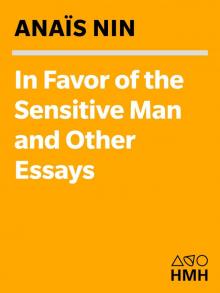 In Favor of the Sensitive Man and Other Essays (Original Harvest Book; Hb333)
In Favor of the Sensitive Man and Other Essays (Original Harvest Book; Hb333)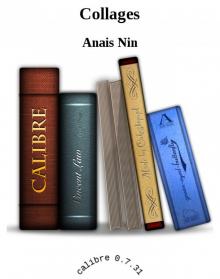 Collages
Collages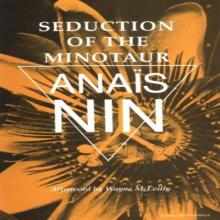 Seduction of the Minotaur
Seduction of the Minotaur Children of the Albatross
Children of the Albatross Delta of Venus
Delta of Venus The Four-Chambered Heart coti-3
The Four-Chambered Heart coti-3 Diary of Anais Nin, Volume 2
Diary of Anais Nin, Volume 2 Diary of Anais Nin, Volume 1
Diary of Anais Nin, Volume 1 Diary of Anais Nin, Volume 4
Diary of Anais Nin, Volume 4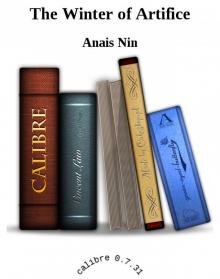 The Winter of Artifice
The Winter of Artifice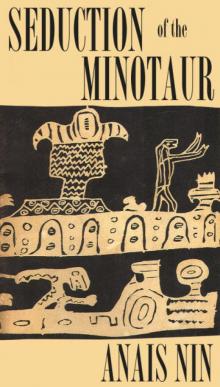 Seduction of the Minotaur coti-5
Seduction of the Minotaur coti-5 Children of the Albatross coti-2
Children of the Albatross coti-2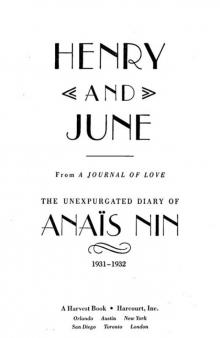 Henry and June: From A Journal of Love -The Unexpurgated Diary of Anaïs Nin (1931-1932)
Henry and June: From A Journal of Love -The Unexpurgated Diary of Anaïs Nin (1931-1932) Ladders to Fire
Ladders to Fire House of Incest
House of Incest